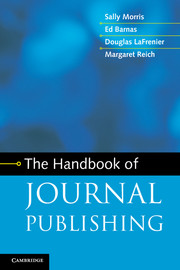Book contents
- Frontmatter
- Contents
- Preface and acknowledgments
- 1 Introduction to journals
- 2 Managing journals
- 3 Editing
- 4 The production process
- 5 Journal metrics
- 6 Marketing and sales
- 7 Fulfillment
- 8 Journal finances
- 9 Subsidiary income
- 10 Contract publishing
- 11 Copyright and other legal aspects
- 12 Ethical issues
- 13 The future of scholarly communication
- Appendix 1 Glossary
- Appendix 2 Resources
- Appendix 3 Vendors
- Index
- References
10 - Contract publishing
Published online by Cambridge University Press: 05 March 2013
- Frontmatter
- Contents
- Preface and acknowledgments
- 1 Introduction to journals
- 2 Managing journals
- 3 Editing
- 4 The production process
- 5 Journal metrics
- 6 Marketing and sales
- 7 Fulfillment
- 8 Journal finances
- 9 Subsidiary income
- 10 Contract publishing
- 11 Copyright and other legal aspects
- 12 Ethical issues
- 13 The future of scholarly communication
- Appendix 1 Glossary
- Appendix 2 Resources
- Appendix 3 Vendors
- Index
- References
Summary
Introduction
It has been said that as soon as the number of scholars in a given subject area reaches 500, two events generally occur: a society is formed and a new journal is launched. Although many societies publish their own journals, the majority of society journals are published under contract. Many new and smaller societies (and indeed some large ones) prefer to partner with a publisher to launch a new journal. The partner could be a commercial publisher, a non-profit University Press, or a related larger society with its own publishing program. (See discussion of societies’ role in journal publishing in Chapter 1, Introduction to journals.)
While this chapter addresses contract publishing for societies, a journal may equally be owned by other bodies such as an academic department at a university or an independent institute. In addition, the “publisher” may also be a society that publishes its own journal and offers publishing services to other societies. The same procedures generally apply.
Partnering with a publisher to launch a new journal offers a society a number of advantages:
It allows the society to concentrate on its mission to serve its members and advance the field.
It allows the society to retain ownership of the journal without the financial risk of self-publishing.
It provides a reduced-rate publication to members, again without the financial risk of self-publishing.
It provides access to a depth of publishing and marketing expertise which would be difficult to match for a single title.
…
- Type
- Chapter
- Information
- The Handbook of Journal Publishing , pp. 297 - 317Publisher: Cambridge University PressPrint publication year: 2013

